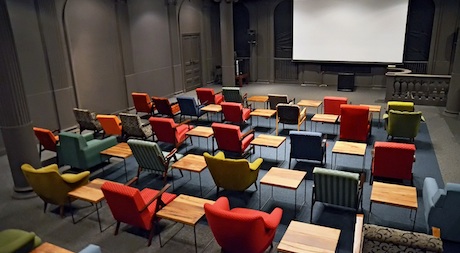 The City of Zagreb bought the cinema after a campaign by the Zagreb Film Festival and the Croatian Film Association. In 2008 Zagreb Film Festival was entrusted with the management of Cinema Europa.
The City of Zagreb bought the cinema after a campaign by the Zagreb Film Festival and the Croatian Film Association. In 2008 Zagreb Film Festival was entrusted with the management of Cinema Europa.
The cinema has a main auditorium with 500 seats, Müller Hall with 80 seats, a gift shop, two lobbies for small-scale events, and a bar. The activities of Cinema Europa are supported by the City of Zagreb, the Croatian Audiovisual Centre, the Ministry of Culture and Ministry of Entrepreneurship and Crafts. Cinema Europa is a member of the Europa Cinemas Network and the International Confederation of Art Cinemas (CICAE) from 2008. It is also supported by the European Union's MEDIA programme.
Cinema Europa was declared a protected cultural heritage and national treasure of the Republic of Croatia in 2013 and was recently digitalised. Its manager, Hrvoje Laurenta, is also the executive director of the Zagreb Film Festival which will be held this year from 20 to 27 October 2013.
FNE: What is the biggest challenge of running a cinema such as yours?
Hrvoje Laurenta: Our biggest challenges are the education of audiences and the preservation of our cinema's building. Since independent cinema is relatively new in Croatia, our major challenge is to educate our viewers, getting them used to our programmes and convincing them that there is an excellent alternative to commercial films: top-quality films that make one think and discuss things, films tackling important themes in the society, films which are not traditional and which seek new angles and narratives.
Due to lack of films of the type that we show, we have added a new activity to the programs we offer: it is the distribution of independent films from all over the world (with particular emphasis on European films). Its purpose is to provide our cinema and all other Croatian cinemas with a diverse and rich film program. The Cinema Europa building is a protected national heritage of the Republic of Croatia. It was built in 1924 and had never undergone serious reconstruction.
 We are investing a lot of effort into the reconstruction and technical improvement of the building in order to achieve complete reconstruction of this iconic and most beautiful movie theatre in Croatia. In addition to the above, our duty is also to help all independent theatres across the country to survive and not stop showing their programmes. Having undertaken numerous activities and lobbying, we have managed to raise public awareness and promote the efforts aimed at saving Croatian movie theatres from disaster.
We are investing a lot of effort into the reconstruction and technical improvement of the building in order to achieve complete reconstruction of this iconic and most beautiful movie theatre in Croatia. In addition to the above, our duty is also to help all independent theatres across the country to survive and not stop showing their programmes. Having undertaken numerous activities and lobbying, we have managed to raise public awareness and promote the efforts aimed at saving Croatian movie theatres from disaster.
FNE: What kinds of films do you prefer to screen and why?
HL: We show only artistically, culturally and thematically worthwhile films from all over the world, with particular emphasis on European films which account for more than 70% of our programme. We show these films as part of our regular programmes and during numerous festivals and other film events, 365 days a year. Annually, we show some 50 films in regular distribution; we host 17 festivals and events; some 40 premieres take place here. Audiences cannot see commercial films and blockbusters in our theatre; we are oriented exclusively toward independent and art films. They make up the basis of our program.
FNE: The cinema is home to many festivals, events and film weeks. Why are these important and what do they achieve?
HL: In all, the film festivals, events and premieres taking place in the building account for more than 40% of our overall annual programme, and they are important for the following reasons: first of all, it is an opportunity for the audience to see recent films they otherwise would not have a chance to see. Given the fact that independent and art cinemas have appeared in Croatia relatively recently, festivals are an important and – until recently – were the only place where one could see contemporary independent and art films from all over the world.
Also, as Croatian audiences are more accustomed to film events than to regular cinema programmes, this is an opportunity for us to bring large audiences to the cinema, showing them the alternative to commercial films and educating them cinematically. Festivals are places that bring together people of all ages, views and ways of thinking. These people are the "material" from which the audience for our regular programme is created.
 FNE: What is role of Europa Cinemas for exhibitors such as yourself and why is it important?
FNE: What is role of Europa Cinemas for exhibitors such as yourself and why is it important?
HL: Europa Cinemas Network is of exceptional importance for our cinema. First of all, it provides us with a financial support which is indispensable for maintaining the high level of our programmes and with the safety required for the realization of our programmes. Furthermore, the network has, through its numerous activities, educated us and oriented us to European films, which make up more than 70% of our programme – a fact that makes us very proud.
And finally, through numerous communication channels and the annual meeting, the network gives us an opportunity to meet our colleagues from all over Europe and get in touch with them in order to elevate the quality of our activities and programmes to the highest possible level by exchanging knowledge and experience. Europa Cinemas gives us the means, knowledge and badly need networking that make us better and more successful. We are very grateful for that.
FNE: Can you say something about your work with young audiences?
HL: We work a lot with children and adolescents – they are our token for the future and an audience we must educate from childhood. As part of the Zagreb Film Festival which we organize, we have a very popular children's programme – Bib for Kids – enabling more than 3,000 schoolchildren from Zagreb every year to both visit our cinema and see European children's films that they would not have a chance to see otherwise.
We introduce them to European languages, cultures and views. In the context of the flood of highly commercial, mostly US films for children, we find it exceptionally important. Children's reactions are excellent; for most of them it is the first opportunity to become acquainted with diverse European cultures, as well as with Cinema Europa. Later on, they gladly return to it. Throughout the year we organize numerous specialized programmes for the children of pre-school, primary-school and secondary-school age. It is not an easy task because modern kids are hard to separate from their tablets and TVs, but this makes our job all the more interesting.
And if it results in packed audiences watching children's films, we are even happier. Our task and duty is to educate the public in film. Children and adolescents are our most important target group because it will yield our future audiences and film professionals. Going to a movie is a big thing for children, but we cannot compete with multiplexes – their funds for marketing are much higher than ours. However, we are trying to attract children by offering programmes which are of a much higher quality than the ones offered to them by commercial cinemas. For now, we are on the right way.
 FNE: What about the digitalisation of cinemas? How will it affect your work and your cinema?
FNE: What about the digitalisation of cinemas? How will it affect your work and your cinema?
The programme of digitalisation of independent cinemas in Croatia, launched by the Croatian Audiovisual Centre and the Ministry of Culture, has just been completed throughout the country and 28 cinemas are now equipped for digital screenings. Our equipment was installed approximately two weeks ago. It opens numerous possibilities we did not have before. First of all, it will reduce our screening and distribution costs because there will be no more expensive and heavy 35mm tapes.
Furthermore, our programme will certainly offer more films and be more diverse because now we have an opportunity to show a larger number of films, not just in the regular programme but also during festivals and film events. And, lastly and probably most importantly, since our regular programme includes only modern films, we would probably have to close the cinema if it wasn't for this equipment, because we would have nothing to screen any more.
The same also applies to the remaining 27 cinemas in Croatia which have been digitalized. Unfortunately for die-hard film lovers, 35mm film is now a thing of the past. However, the new digital equipment opens new doors and new opportunities and will certainly make our programme better and more diverse.
Contact
Varšavska 3
10 000 Zagreb
This email address is being protected from spambots. You need JavaScript enabled to view it.




















